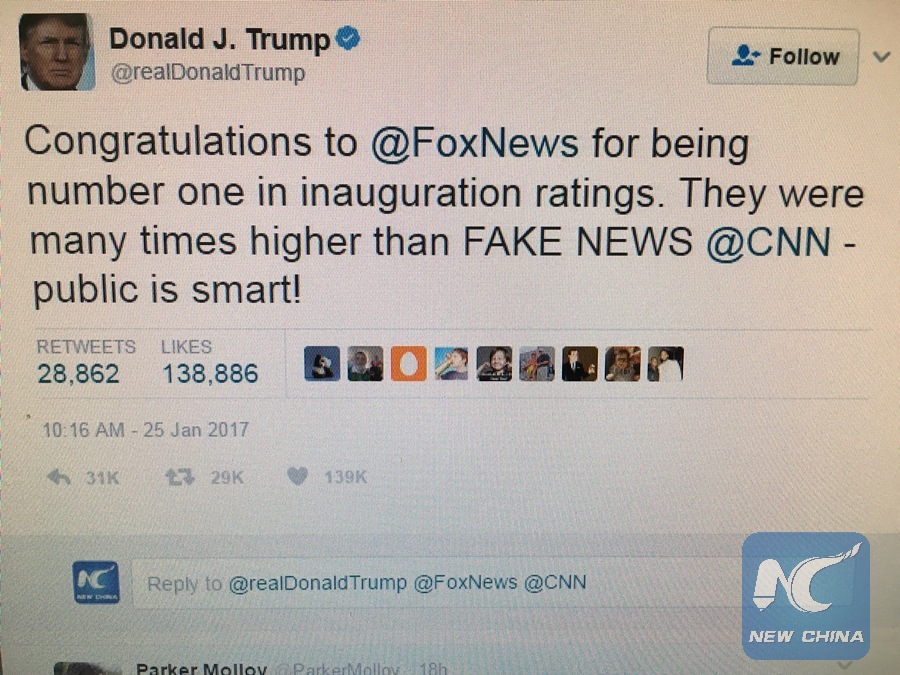
Screen shot of U.S. President Donald Trump's tweet about Media's coverage of inauguration ceremony on Jan. 25, 2017. (Xinhua photo)
by Matthew Rusling
WASHINGTON, Jan. 25 (Xinhua) -- The White House and U.S. media are already at each other's throats as President Donald Trump kicks off his term, and experts expect the animosity to last for a while.
Trump, who shocked the world in November by defeating his Democrat rival Hillary Clinton, had a poor relationship with the U.S. press during his campaign, as he repeatedly pounded the press and certain reporters for treating him unfairly.
On Trump's first day as president earlier this week, he stated he had a "running war" with U.S. media, and that he would fight the media tooth and nail.
Experts said that if the first week is any indication of what the future holds, it looks like the animosity will continue.
"I think there will be a more adversarial relationship between Trump and the Washington media, as both administration officials as well as Trump supporters have long been skeptical of the way that the media has covered Trump specifically and conservatives in general," Dan Mahaffee, an analyst with the Center for the Study of the Presidency and Congress, told Xinhua.
Republican Strategist Ford O'Connell told Xinhua the war between the White House and the U.S. press looks like it will continue for the next four years.
"You have to understand that the mainstream media as a whole detest Trump and basically can't figure out why his supporters voted for him," O'Connell said.
The media doesn't understand the appeal of Trump and is going to be chipping away at him, unless Trump can strike up some successes over the next 100 days.
"If he winds up successful in the first 100 days, what I expect is for them (the U.S. media) to sort of tone it down," he said.
Christopher Galdieri, assistant professor at Saint Anselm College in New Hampshire, also believed that the bitter rivalry between Trump and the media is likely to continue.
One reason, he said, is due to what much media say are the false claims of White House Press Secretary Sean Spicer during his first press conference on the weekend.
Spicer asserted that Friday's inauguration showed record attendance. In response, some media published photos comparing Friday's event with former President Barack Obama's inauguration in 2008, showing far more attendees at Obama's event.
"I would agree that this is not as important, in the grand scheme of policy, as international trade, health care, and other issues. But I think it has a corrosive effect that makes the press more skeptical of the administration. And it suggests that Trump's obsession with optics, hugeness, and so on will continue into his presidency," Galdieri told Xinhua.
Brookings Institution Darrell West told Xinhua that the relationship between Trump and reporters remains quite contentious. "It was difficult during the campaign and has gotten worse since then," he said.
"The president regularly lambasts reporters and calls them dishonest. There is no reason to think this relationship is going to improve. Neither side trusts the other," he said.
But Mahaffee believes that the relationship could improve in the future as both sides need to cooperate for press to get their stories and for the Trump administration to get their policies covered.
"Furthermore, many of the Trump Administration team that aren't used to the regular scrutiny of the press will become used to how the media covers the White House," he said.

